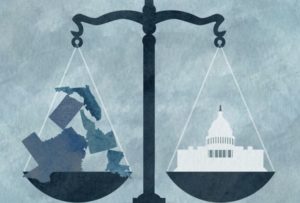Criticisms of the Electoral College are regularly repeated in Democratic-controlled state legislatures. Those criticisms derive largely from ignorance as to why the Founders adopted the system they did.
For example, it is not true, as some claim, that the Founders acted only out of distrust of democracy. Rather, the system was a brilliant response to a complicated set of issues — issues remaining with us today.
When the framers wrote the presidency into the Constitution, they created an office unlike any created before. The president was to be a single republican chief executive, exercising real power, and doing so within a true federal system with strong states.
Indeed, even today the office remains almost unique: Many Western style governments are parliamentary rather than presidential. Most of the presidential governments are unitary, or nearly unitary, rather than federal.
Having created a unique office, the Founders needed an adequate process for choosing its occupant. They set forth several criteria:
- The electoral process had to produce presidents competent to discharge their extensive responsibilities. Not only must the president be qualified for the job, but he must be able to exercise judgment independent of Congress and of the states. Thus, those directly choosing among the candidates should either know them personally or have reliable knowledge of their character and qualifications.
- The process should give great weight to popular preferences, while minimizing dangers of “stampeding” and other mob-like behavior.
- It should reduce the risks of foreign and other secret influence.
- It should balance state and national interests.
- It should produce presidents of national stature. A purely regional executive could tear the country apart, either by his election or by policies favoring some parts of the country at the expense of others.
- The process should discourage states from trying to increase their influence by artificially inflating their vote levels.
Some o![]() f these criteria contended against each other. For example, the new electoral system had to accommodate state interests, but the accommodation should not go so far as to allow the states to dictate the winner.
f these criteria contended against each other. For example, the new electoral system had to accommodate state interests, but the accommodation should not go so far as to allow the states to dictate the winner.
The final result was the product of weeks of convention debate, further discussion in an extraordinarily talented convention committee, and subsequent modification by the convention at large and by the 12th Amendment.
Here’s how the system addresses the criteria listed above.
- To assure the president is a person of national standing, each elector votes for two candidates, at least one of whom is not from the elector’s home state. The winning candidate must garner a majority — not merely a plurality — of electors.
- If no candidate wins a majority, there is a run-off election in the House of Representatives. The vote in the House is by state delegation. Two thirds of all Representatives must be present, and the affirmative vote of a majority of all states is necessary for election.
- Thus, even if the winner is not the most popular person in the country, at least he enjoys wide national support. Candidates with merely regional support almost never win.
- Electors are temporary officers. The president does not owe his job to Congress or to any collection of standing officers or states. This ensures the president’s independence.
- Each state’s electors convene in their own state capitals rather than in a central location. This reduces risks of mob-like behavior, foreign influence, improper lobbying, and corruption.
- State-by-state voting ensures that cases of voter fraud are contained within state boundaries. State-by-state voting also reduces incentives for inflating state popular vote totals.
- Electoral votes are distributed among states mostly by population, but each has at least three votes. The balance between state and national interests also is evident in the rules for the House run-off.
- State governments decide how electors are chosen, but — under a proper reading of the Constitution — cannot dictate their decisions. Electors may campaign as favoring certain candidates, parties, or views. But like other officials they are supposed to remain free to change their minds.
- The electors’ independent discretion would, if still honored, encourage those selecting them (today in all states, the people) to choose citizens able to make informed decisions.
Did the Electoral College worked as intended in 2016? Yes and no.
It worked insofar as it denied election to Hillary Clinton, who, although the popular vote choice, was largely a regional candidate. But it failed to work insofar as state statutes prevented electors from voting for any candidates other than two widely seen as unacceptable. Those statutes also discouraged qualified people from seeking the office of presidential elector.
Rob Natelson is senior fellow in Constitutional Jurisprudence at the Independence Institute in Denver. He has published extensively on the Constitution and is the author of The Original Constitution: What It Actually Said and Meant. A version of this article originally appeared the Daily Caller.


